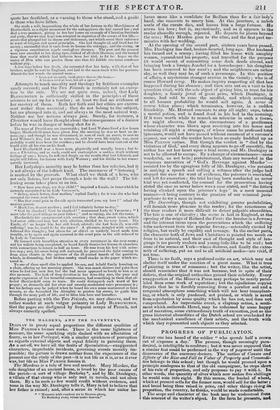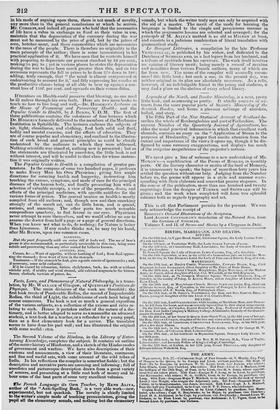PROGRESS OF PUBLICATION.
EVERY one has heard of the soldier "who spends half a crown out of sixpence a day." The process, though seemingly para- doxical, is intelligible to creditors; but it was never supposed that a similar feat could be performed in the way of payment until the discoveries of the currency-doctors. The author of Causes and Effects of the Rise and Fall in Value of Property and Commodi- ties belongs to this school ; but though he would proceed upon a principle analogous to that of the old campaigner, he stops short of his rule of proportion, and only proposes to pay 8 with 5.. In other words, the quantity of silver which now makes five shillings he would coin into eight. By this means, the bushel of wheat, which at present sells for the former sum, would sell for the latter ; and bread being thus raised in price, and other things rising ha proportion, the country, he thinks, would be made comfortable.
The scope and character of the book may be understood from this account of its writer's object. In the facts he presents, sad. in his mode of arguing upon them, there is not much of novelty, any more than in the general conclusions at which he arrives. Mr. Connarr, and indeed all persons who hold that the necessaries of life have a value in exchange as fixed as their value in use, Maintain that the depreciation of the currency during the war must not be measured by the price of gold, but by the prices of corn, butcher-meat, and those commodities which are necessaries to the mass of the people. There is therefore no originality in the main principle of the author; there is some inconsistency in his practical application of it. We have seen that he contents himself with proposing to depreciate our present standard by 60 per cent., making 5s. pay 8s.; yet in various places he states the depreciation during the war to have been much greater than this, and on two occasions represents the fall in prices to be from 278 down to 100; adding, truly enough, that " the mind is almost overpowered in endeavouring to account for it," and fitly expressing his wonder at the productive classes being at all able to bear up against a con- stant loss of 150/. per cent. and upwards on their commodities.




























 Previous page
Previous page